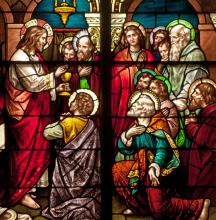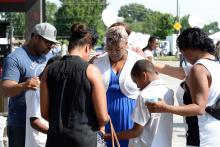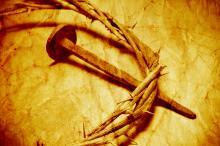Letter to the Editors
Departments

DURING THE EASTER SEASON, the first reading in our lectionary becomes, strangely, a New Testament reading. Most of the year, we immerse ourselves in the scripture we share with the Jews, but after the resurrection we traipse through the book of Acts. The claim being made is that the history of God’s chosen people continues in the history of the church. God is still working signs and wonders. And these include the sharing of goods in common, the fact that there are no needy people among us, bringing awe and distress among our neighbors, and a dawning kingdom brought slightly closer. Just like in our churches and communities today, right?
These Easter texts are also deeply sensual and material. God’s reign is imagined as a banquet with rich wines and marrow-filled meats. Love between sisters and brothers is like oil running down the head, over the face. The resurrection texts themselves insist on this point more emphatically than any other: Jesus is raised in his body. This is the beginning of God’s resurrecting power breaking out all over the creation God loves. What could ever be impossible after a resurrection? Our limited imaginations of the possible (Can we make budget? Can we get a few more votes on this bill? Can we improve lives in this neighborhood?) are shown for the bankruptcy in which they are mired. A new order is here. We pray, God, make our imaginations match the sensuousness, the materiality, the grandeur of what you have already accomplished and, more daringly still, what you promise yet to do.

Mother, mother / There’s too many of you crying / Brother, brother, brother / There’s far too many of you dying —Marvin Gaye
then they stomped
John Willet
as he lay on the sidewalk
hands cuffed behind his back
and shot
Michael Brown
who was on his way this fall to college
Stop and frisk
Stop and frisk
and used a chokehold to kill

ONE OF THE UNANTICIPATED effects of our health-care technologies is that we expect to live relatively pain-free lives, physically speaking. In the West, we do not imagine a physician saying to us “this will hurt” before cutting in. We expect to be anesthetized to avoid pain. In the same way we struggle with a biblical pathway to God, like Lent.
In Lent, we put ourselves on a lonely road with Jesus—40 days in the wilderness, struggling with hunger, thirst, loneliness, doubt, fear. In Lent, we put ourselves in a 40-year journey in the wilderness with the people Israel, wondering when, if ever, God will make good on the promises of a land flowing with milk and honey. In Lent, we do business with repentance.
Whatever else the church may say about repentance, we certainly say, “This will hurt. And not just a little.” Repentance means “turning around.” It also means dying, biblically speaking. We are drowned in baptism and raised to new life; we go to extremes in the wild until an entire generation dies off (the exodus) and until we are reduced to one searing set of emotions (the crucifixion). Jesus’ cross wasn’t light. Why should we expect ours to be?
Then there’s the good news. A resurrection is on the far side of that cross. Its blinding light pours around the edges of the stone rolled before the tomb. Resurrection is not in Lent, but it’s coming. In the meantime, in the words of John the Baptist, “Prepare the way.”

1. How would you describe Akilah Institute’s goals for its students and alumnae? Rwanda today is a far cry from the genocide-torn country that most think of when they hear about it. Rwandans have a vision of a knowledge-based economy, and Rwanda is fast becoming the region’s leader in information technology and new business development. And yet, only 1 percent of Rwandans attend university, and just 30 percent of these are women. We want to make sure that young women have a part to play in building the country’s future.
Akilah’s unique model of market-relevant education empowers young women to launch professional careers and assume leadership roles when they graduate. During their three years at Akilah, students develop English fluency, leadership, public speaking, and critical-thinking skills.

The tale of nails and wood
is retold on the BBC from Winchester,
with hymns about a balm in Gilead,
a wondrous cross, and the choirboys’ echo
of the Fauré Requiem. Cardinal Newman
sends blessings from the grave,
and the organ grumbles “Amen.”

THE LAST SUNDAY IN FEBRUARY is the first Sunday of Lent. We are asked to prepare for Lent by searching our souls and repenting of our misdeeds in order to walk with Jesus on his road to the cross. After writing the final reflections below, I felt unfinished. Repentance is easy to talk about but exceedingly hard to do. We justify and excuse our actions when we’ve hurt a friend or made a bad choice. It’s usually someone else’s fault anyhow—they started it!
The most striking example of human resistance to repentance I’ve ever read was in C.S. Lewis’ little book The Great Divorce. The “divorce” is the huge gap between heaven and hell. Hell is not fiery but filled with people who can’t get along with each other and keep moving further apart in the darkness. Eventually, a few make their way to a bus stop where they get a ride to the outskirts of heaven. There everyone is met by someone from their past they’d rather not meet, and who begs them to repent, make restitution, or whatever is necessary to enjoy a joyful eternity of loving relationships. For almost all of them, it’s not worth it. They fear losing the bit of ego they have left. They’d rather go back to hell than repent and be reconciled with someone they love to hate.
No wonder repenting is the first step to entering the kingdom of God!

When it comes to living small,
you were ahead of your time,
which is why I nominate you
patron saint of tiny homes. So
you haven’t heard of them?